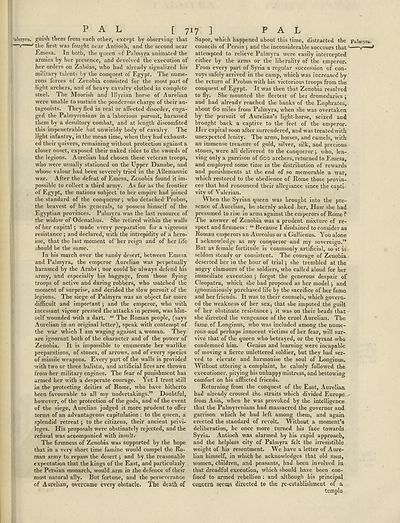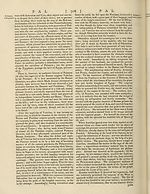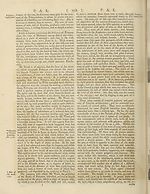Encyclopaedia Britannica > Volume 15, NIC-PAR
(793) Page 717
Download files
Complete book:
Individual page:
Thumbnail gallery: Grid view | List view

PAL [7
almyra. guisli tliem from each other, except by observing that
' the first was fought near Antioch, and the second near
Emesa. In both, the queen of Palmyra animated the
armies by her presence, and devolved the execution of
her orders on Zabdas, who had already signalized his
military talents by the conquest of Egypt. The nume¬
rous forces of Zenobia consisted for the most part of
light archers, and of heavy cavalry clothed in complete
steel. The Moorish and Illyrian horse of Aurelian
were unable to sustain the ponderous charge of their an¬
tagonists. They fled in real or affected disorder, enga¬
ged the Palmyrenians in a laborious pursuit, harassed
them by a desultory combat, and at length discomfited
this impenetrable but unwieldy body of cavalry. The
light infantry, in the mean time, when they had exhaust¬
ed their quivers, remaining without protection against a
closer onset, exposed their naked sides to the swords of
the legions. Aurelian had chosen these veteran troops,
who were usually stationed on the Upper Danube, and
whose valour had been severely tried in the Allemannic
war. After the defeat of Emesa, Zenobia found it im¬
possible to collect a third army. As far as the frontier
of Egypt, the nations subject to her empire had joined
the standard of the conqueror; who detached Probus,
the bravest of his generals, to possess himself of the
Egyptian provinces. Palmyra was the last resource of
the widow of Odenathus. She retired within the walls
of her capital 5 made every preparation for a vigorous
resistance ; and declared, with the intrepidity of a hero¬
ine, that the last moment of her reign and of her life
should be the same.
In his march over the sandy desert, between Emesa
and Palmyra, the emperor Aurelian was perpetually
harassed by the Arabs 5 nor could he always defend his
army, and especially his baggage, from those flying
troops of active and daring robbers, who watched the
moment of surprise, and derided the slow pursuit of the
legions. The siege of Palmyra was an object far more
difficult and important 5 and the emperor, who with
incessant vigour pressed the attacks in person, was him¬
self wounded with a dart. “ The Roman people, (says
Aurelian in an original letter), speak with contempt of
the war which I am waging against a,woman. They
are ignorant both of the character and of the power of
Zenobia. It is impossible to enumerate her warlike
preparations, of stones, of arrows, and of every species
of missile weapons. Every part of the walls is provided
with two or three balistse, and artificial fires are thrown
from-her military engines. The fear of punishment has
armed her with a desperate courage. Yet I trust still
in the protecting deities of Rome, who have hitherto
been favourable to all my undertakings.” Doubtful,
however, of the protection of the gods, and of the event
of the siege, Aurelian judged it more prudent to offer
terms of an advantageous capitulation : to the queen, a
splendid retreat $ to the citizens, their ancient privi¬
leges. His proposals were obstinately rejected, and the
refusal was accompanied with insult;
The firmness of Zenobia was supported by the hope
that in a very short time famine would compel the Ro¬
man army to repass the desert ; and by, the reasonable
expectation that the kings of the East, and particularly
the Persian monarch, would arm in the defence of their
most natural ally. But fortune, and the perseverance
of Aurelian, overcame every obstacle. The death of
[? ] PAL
Sapor, which happened about this time, distracted the palaiyra.
councils of Persia 5 and the inconsiderable succours that1 sr*-
attempted to relieve Palmyra were easily intercepted
either by the arms or the liberality of the emperor.
From every part of Syria a regular succession of con¬
voys safely arrived in the camp, which was increased by
the return of Probus with his victorious troops from the
conquest of Egypt. It was then that Zenobia resolved
to fly. She mounted the fleetest of hei dromedaries j
and had already reached the banks of the Euphrates,
about 60 miles from Palmyra, when she was overtaken
by the pursuit of Aurelian’s light-horse, seized and
brought back a captive to the feet of the emperor.
Her capital soon after surrendered, and was treated with
unexpected lenity. The arms, horses, and camels, with
an immense treasure of gold, silver, silk, and precious
stones, were all delivered to the conqueror^ who, lea-,
ving only a garrison of 600 archers, returned to Emesa,
and employed some time in the distribution of rewards
and punishments at the end of so memorable a war,
which restored to the obedience of Rome those provin¬
ces that had renounced their allegiance since the capti¬
vity of Valerian.
When the Syrian queen was brought into the pre¬
sence of Aurelian, he sternly asked her, How she had
presumed to rise in arms against the emperors of Rome?
The answer of Zenobia was a prudent mixture of re¬
spect and firmness : “ Because I disdained to consider as
Roman emperors an Aureolus or a Gallienus. You alone
I acknowledge as my conqueror and my sovereign.”
But as female fortitude is commonly artificial, so it is
seldom steady or consistent. The courage of Zenobia
deserted her in the hour of trial j she trembled at the
angry clamours of the soldiers, who called aloud for her
immediate execution j forgot the generous despair of
Cleopatra, which she had proposed as her model j and
ignominiously purchased life by the sacrifice of her fame
and her friends. It was to their counsels, which govern.-
ed the weakness of her sex, that she imputed the guilt
of her obstinate resistance j it was on their heads that
she directed the vengeance of the cruel Aurelian. The
fame, of Longinus, who was included among the nume¬
rous and perhaps innocent victims of her fear, will sur¬
vive that of the queen who-betrayed, or the tyrant who
condemned him. Genius and learning were incapable
of moving a fierce unlettered soldier, but they had ser¬
ved to elevate and harmonise the soul of Longinus.
Without uttering a complaint, he calmly followed the
executioner, pitying his unhappy mistress, and bestowing
comfort on his afflicted friends.
Returning from the conquest of the East, Aurelian
had already crossed the straits which divided Europe
from Asia, when he was provoked by the intelligence
that the Palmyrenians had massacred the governor and
garrison which he had left among them, and again
erected the standard of revolt. Without a moment’s
deliberation, he once more turned his face towards
Syria. Antioch was alarmed by his rapid approach,
and the helpless city of Palmyra felt the irresistible
weight of his resentment. We have a letter of Aure¬
lian himself, in which he acknowledges that old men,
women, children, and peasants, had been involved in
that dreadful execution, which should have been con¬
fined to armed rebellion : and although his principal
concern seems directed to the re-establishment of a
, temple
almyra. guisli tliem from each other, except by observing that
' the first was fought near Antioch, and the second near
Emesa. In both, the queen of Palmyra animated the
armies by her presence, and devolved the execution of
her orders on Zabdas, who had already signalized his
military talents by the conquest of Egypt. The nume¬
rous forces of Zenobia consisted for the most part of
light archers, and of heavy cavalry clothed in complete
steel. The Moorish and Illyrian horse of Aurelian
were unable to sustain the ponderous charge of their an¬
tagonists. They fled in real or affected disorder, enga¬
ged the Palmyrenians in a laborious pursuit, harassed
them by a desultory combat, and at length discomfited
this impenetrable but unwieldy body of cavalry. The
light infantry, in the mean time, when they had exhaust¬
ed their quivers, remaining without protection against a
closer onset, exposed their naked sides to the swords of
the legions. Aurelian had chosen these veteran troops,
who were usually stationed on the Upper Danube, and
whose valour had been severely tried in the Allemannic
war. After the defeat of Emesa, Zenobia found it im¬
possible to collect a third army. As far as the frontier
of Egypt, the nations subject to her empire had joined
the standard of the conqueror; who detached Probus,
the bravest of his generals, to possess himself of the
Egyptian provinces. Palmyra was the last resource of
the widow of Odenathus. She retired within the walls
of her capital 5 made every preparation for a vigorous
resistance ; and declared, with the intrepidity of a hero¬
ine, that the last moment of her reign and of her life
should be the same.
In his march over the sandy desert, between Emesa
and Palmyra, the emperor Aurelian was perpetually
harassed by the Arabs 5 nor could he always defend his
army, and especially his baggage, from those flying
troops of active and daring robbers, who watched the
moment of surprise, and derided the slow pursuit of the
legions. The siege of Palmyra was an object far more
difficult and important 5 and the emperor, who with
incessant vigour pressed the attacks in person, was him¬
self wounded with a dart. “ The Roman people, (says
Aurelian in an original letter), speak with contempt of
the war which I am waging against a,woman. They
are ignorant both of the character and of the power of
Zenobia. It is impossible to enumerate her warlike
preparations, of stones, of arrows, and of every species
of missile weapons. Every part of the walls is provided
with two or three balistse, and artificial fires are thrown
from-her military engines. The fear of punishment has
armed her with a desperate courage. Yet I trust still
in the protecting deities of Rome, who have hitherto
been favourable to all my undertakings.” Doubtful,
however, of the protection of the gods, and of the event
of the siege, Aurelian judged it more prudent to offer
terms of an advantageous capitulation : to the queen, a
splendid retreat $ to the citizens, their ancient privi¬
leges. His proposals were obstinately rejected, and the
refusal was accompanied with insult;
The firmness of Zenobia was supported by the hope
that in a very short time famine would compel the Ro¬
man army to repass the desert ; and by, the reasonable
expectation that the kings of the East, and particularly
the Persian monarch, would arm in the defence of their
most natural ally. But fortune, and the perseverance
of Aurelian, overcame every obstacle. The death of
[? ] PAL
Sapor, which happened about this time, distracted the palaiyra.
councils of Persia 5 and the inconsiderable succours that1 sr*-
attempted to relieve Palmyra were easily intercepted
either by the arms or the liberality of the emperor.
From every part of Syria a regular succession of con¬
voys safely arrived in the camp, which was increased by
the return of Probus with his victorious troops from the
conquest of Egypt. It was then that Zenobia resolved
to fly. She mounted the fleetest of hei dromedaries j
and had already reached the banks of the Euphrates,
about 60 miles from Palmyra, when she was overtaken
by the pursuit of Aurelian’s light-horse, seized and
brought back a captive to the feet of the emperor.
Her capital soon after surrendered, and was treated with
unexpected lenity. The arms, horses, and camels, with
an immense treasure of gold, silver, silk, and precious
stones, were all delivered to the conqueror^ who, lea-,
ving only a garrison of 600 archers, returned to Emesa,
and employed some time in the distribution of rewards
and punishments at the end of so memorable a war,
which restored to the obedience of Rome those provin¬
ces that had renounced their allegiance since the capti¬
vity of Valerian.
When the Syrian queen was brought into the pre¬
sence of Aurelian, he sternly asked her, How she had
presumed to rise in arms against the emperors of Rome?
The answer of Zenobia was a prudent mixture of re¬
spect and firmness : “ Because I disdained to consider as
Roman emperors an Aureolus or a Gallienus. You alone
I acknowledge as my conqueror and my sovereign.”
But as female fortitude is commonly artificial, so it is
seldom steady or consistent. The courage of Zenobia
deserted her in the hour of trial j she trembled at the
angry clamours of the soldiers, who called aloud for her
immediate execution j forgot the generous despair of
Cleopatra, which she had proposed as her model j and
ignominiously purchased life by the sacrifice of her fame
and her friends. It was to their counsels, which govern.-
ed the weakness of her sex, that she imputed the guilt
of her obstinate resistance j it was on their heads that
she directed the vengeance of the cruel Aurelian. The
fame, of Longinus, who was included among the nume¬
rous and perhaps innocent victims of her fear, will sur¬
vive that of the queen who-betrayed, or the tyrant who
condemned him. Genius and learning were incapable
of moving a fierce unlettered soldier, but they had ser¬
ved to elevate and harmonise the soul of Longinus.
Without uttering a complaint, he calmly followed the
executioner, pitying his unhappy mistress, and bestowing
comfort on his afflicted friends.
Returning from the conquest of the East, Aurelian
had already crossed the straits which divided Europe
from Asia, when he was provoked by the intelligence
that the Palmyrenians had massacred the governor and
garrison which he had left among them, and again
erected the standard of revolt. Without a moment’s
deliberation, he once more turned his face towards
Syria. Antioch was alarmed by his rapid approach,
and the helpless city of Palmyra felt the irresistible
weight of his resentment. We have a letter of Aure¬
lian himself, in which he acknowledges that old men,
women, children, and peasants, had been involved in
that dreadful execution, which should have been con¬
fined to armed rebellion : and although his principal
concern seems directed to the re-establishment of a
, temple
Set display mode to:
![]() Universal Viewer |
Universal Viewer | ![]() Mirador |
Large image | Transcription
Mirador |
Large image | Transcription
Images and transcriptions on this page, including medium image downloads, may be used under the Creative Commons Attribution 4.0 International Licence unless otherwise stated. ![]()
| Encyclopaedia Britannica > Encyclopaedia Britannica > Volume 15, NIC-PAR > (793) Page 717 |
|---|
| Permanent URL | https://digital.nls.uk/192592007 |
|---|
| Attribution and copyright: |
|
|---|
| Shelfmark | EB.11 |
|---|---|
| Description | Ten editions of 'Encyclopaedia Britannica', issued from 1768-1903, in 231 volumes. Originally issued in 100 weekly parts (3 volumes) between 1768 and 1771 by publishers: Colin Macfarquhar and Andrew Bell (Edinburgh); editor: William Smellie: engraver: Andrew Bell. Expanded editions in the 19th century featured more volumes and contributions from leading experts in their fields. Managed and published in Edinburgh up to the 9th edition (25 volumes, from 1875-1889); the 10th edition (1902-1903) re-issued the 9th edition, with 11 supplementary volumes. |
|---|---|
| Additional NLS resources: |
|

